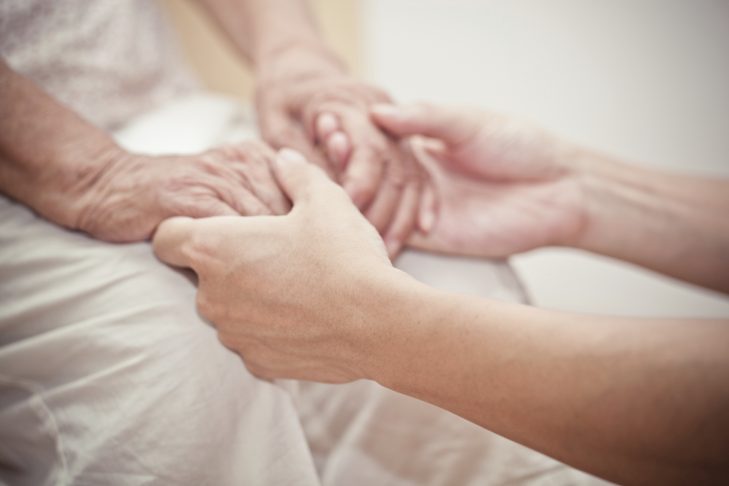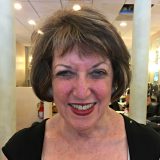So many of us are in the same boat. As we cope with our own aging, we are caring for our parents who may live nearby or far away.
For the past 12 years, my sister (who lives in New York City) and I have been doing our utmost to support our elderly mom, Eleanor, who lives 10 minutes away from me in a senior residence in Boston. This January she passed the milestone of 102.
Having an elderly mother who’s got her wits about her has been a gift. Until recently, she’s been able to play bridge, attend lectures, participate in group discussions, read poetry, short stories and the newspaper and listen to nonfiction on audio books. Ellie has never stopped engaging with the world, constantly quizzing her nephew who works for a U.S. senator about the ins and outs of D.C. politics. In fact, at ages 99 and 100, she made two separate radio appearances on NPR affiliate WGBH commenting on the national scene.
Her grandchildren adore her and have been deeply affected and influenced by her astute observations of life and people. In the last few years she’s witnessed the weddings of her three granddaughters and celebrated the birth of a great-grandson. She has a wealth of family and friends—even many newer ones—who care deeply about her and vice versa.
As so many of my friends have said repeatedly, “She’s amazing.”
But lately it seems my mother is approaching the finish line. While she is not in acute pain, she’s very weak physically and is rapidly declining before our eyes; it’s hard to watch. We have upped the ante with her home health aides to provide many more hours of care a day. We understand her need to engage with close family members to the maximum extent in her waning days—or weeks or months or perhaps years.
But as her “local” daughter, I constantly face the dilemma of how much of my own life to devote to my mother at this stage of her life. To attend to her whenever she calls and be available to be by her side, I am constantly canceling or postponing meetings, social events and even phone calls. In fact, I’m at the point now where I hesitate to plan anything; I’m more or less living in the moment.
My loving and supportive husband is a great help. Our congregational rabbi, too, has been a true source of support to my mom, my sister and me, calling and visiting her frequently. Of course, I went through this when I lost my father 12 years ago, but each situation is unique. I’ve developed a closer relationship with my mother over the past decade than I ever had with her as a younger person, and while her impending loss cannot be considered “tragic,” it will nonetheless be profound for me. Caring for her and being at her side for so many years has become an integral part of my life, but it’s coming to an end before my eyes and still it’s hard to accept.
Up until now, I have been in semi-denial. However, as I reach a new level of understanding and acceptance of the inevitable, I am seeking ways to make this new phase meaningful for my mother, for my family and for me. It means becoming more intentional about our interactions: saying words to each other that we might not ordinarily say, and leaving no room for any regrets about important thoughts left unsaid. All of that is easier said than done, of course, but still I’m trying to ask questions and express thoughts that are not always natural or easy.
Also, I have been asking myself, what is there in Jewish tradition that can help during this period? We are not yet grappling with a death, but for sure we are in a stage of needing to face up to imminent loss. How do we continue to talk about the future with her while all along accepting the reality of death?
A Catholic cousin of mine told me poignantly on a day when Ellie seemed particularly weak that my mom “is in God’s hands now.” Such a simple formulation but so wise. And comforting. In other words, her fate is essentially out of our control.
I have found a number of Jewish teachings helpful to me in coping. The Book of Ecclesiastes tells us poignantly: “To everything there is a season and a time for every purpose under heaven. A time to be born, a time to die….” So, there you have it, this is the time to die—it’s as fundamental as it gets. And no one can argue that my mother has not been granted a very full season of life. My takeaway from these verses is to try to review and celebrate with her the many positive aspects of her fulfilling life, and even to talk about the disappointments as well.
We actually have an excellent model for this kind of retrospective review of one’s life in our Torah: When Moses knows he’s going to die and will never get to enter the promised land, he uses the time he has left on earth to review his life and that of his nation. Both my sister and I continue to encourage our adult children to spend quality time with their Nana during this fraught period and to listen to her stories and share memories.
As we know from the Torah, our biblical patriarchs are depicted as blessing their children before they die. Blessings can be powerful and the first ethical will is attributed to Jacob. This could be the time to seek out my mother’s blessings for her children, grandchildren and great-grandson. What final words of wisdom can she impart to each one of us? We’ll never know unless we ask, and time is of the essence.
I also find the wisdom of Rabbi Hillel in Pirkei Avot very helpful: “If I am not for myself, who will be for me? But if I am only for myself, what am I? And if not now, when?” The first rhetorical question is critical to my mental and physical state. It can be exhausting to provide consistent support to an elderly parent. Hillel advises that we engage in ongoing self-care. I’m making an effort to continue to socialize, write essays and engage in meaningful professional tasks that make me feel productive, but all to a lesser degree. (And so far, I have not given up manicures!) Without a healthy dose of self-care and rest, how can I find the strength to give my all to my mother?
And if not now, when? Could there possibly be a more pertinent piece of advice in the face of imminent mortality? We are definitely at the “now” stage and time is of the essence.
The fifth commandment, “Honor thy father and thy mother,” is clearly relevant. “Honor,” as our rabbis explained after studying these words more than 1,000 years ago, has more to do with showing respect than with love. My mother is still my mother despite her current state of dependency. She gave me life, instilled values in me and provided ongoing love and support. It’s important to continue to actually honor her status as my mother, as my parent, despite her weakness. And even now she continues to dispense sound motherly advice.
When all is said and done, the end of life is part of life. No one prepares us how to behave in the midst of this unsettling period, but it’s inevitable and denial is not the best strategy. I’m aiming instead for acceptance of reality by pursuing a path with greater intentionality that will be meaningful both for Eleanor and her loved ones. We are endeavoring to provide maximum comfort to our remarkable and beloved mother on her final journey by continuing to choose life every day while at the same time coming to terms with the painful reality of mortality.
“To everything there is a season….”
This post has been contributed by a third party. The opinions, facts and any media content are presented solely by the author, and JewishBoston assumes no responsibility for them. Want to add your voice to the conversation? Publish your own post here. MORE



